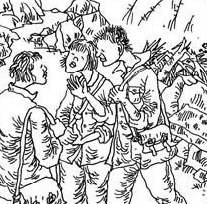After the recent earthquake inflicted tremendous sufferings to several provinces and shook half of the Chinese mainland, there was an opinion, as expressed in Internet forums, that "we should learn to stand in awe of nature". What the opinion means, I guess, is that we should not try to challenge the might of nature by bringing any change to it.
I will agree to it if the opinion implies that man should not violate the rules of nature and he may earn for himself nature's vengeance if he tries to extract too much from it. But I do not think we should become fearful of the elements and remain submissive in front of a bad-tempered Mother Nature.
In fact, the bravery and the unyielding spirit demonstrated by the Chinese people during the blizzards at the beginning of the year and the recent earthquake reflect the most precious traits of the nation that need to be carried on.
Stories of some common people during the earthquake best illustrate this spirit.
After the earthquake on May 12, huge rocks from landslides blocked all roads leading to the quake-struck areas. As most roads were built on mountain slopes over deep valleys, high-power machines could barely function. Army men used bare hands and simple tools to clear the way.
While military troops raced against time to rebuild the roads, groups of civilians appeared on rugged mountain slopes. They were from other places and heading for the quake-hit towns and villages in the hope to find their relatives who they had not heard of since the disaster struck. Though the journeys were mostly dozens of kilometers, they decided to walk there.
Actually, they were not walking but rather climbing, for they had to make their way on rocky ridges overgrown with brambles and creepers most of the time while watching every step to avoid falling into the valleys. Yet they still headed on, carrying food and water for their relatives poised between life and death.
Liu Hongfen, a country woman, traveled about 40 kilometers from Dujiangyan to Yingxiu, the epicenter of the earthquake, to look for her missing husband. She walked non-stop between the two towns three times, each time for two days. What a devoted wife and a determined person.
Another husband-and-wife story is also just as moving. Yao Bangguo carried his wounded wife on his back and walked 100 kilometers from Maoxian to their home in Beichuan. He used two days and two nights to complete the journey, climbing over six mountains.

Children were as brave as the adults. Zhang Jiwan, an 11-year-old boy from Beichuan, carried his 3-year-old sister and walked 12 hours to safety. Their parents had died in the earthquake.
Many netizens said they were moved to tears by the love between the family members while reading these stories on Internet news portals. I too was. But I was also deeply touched by their bravery and tenacity.
Such bravery and tenacity seem to be a tradition for the Chinese people. In the snow-storms that wreaked havoc on southern China in January and February, many people chose to walk along paralyzed highways to go home for the Spring Festival or to come to help their relatives stranded in buses on the way.
Walking is the most primitive way of traveling compared with all the modern convenience of transportation. Yet when adversities struck, our people did not hesitate to adopt it and other bare means to fight against the difficulties. This tradition should not be given up, no matter how much of advanced technologies we master in our drive toward modernization.
E-mail: liushinan@chinadaily.com.cn
(China Daily 06/11/2008 page8)
我要看更多专栏文章